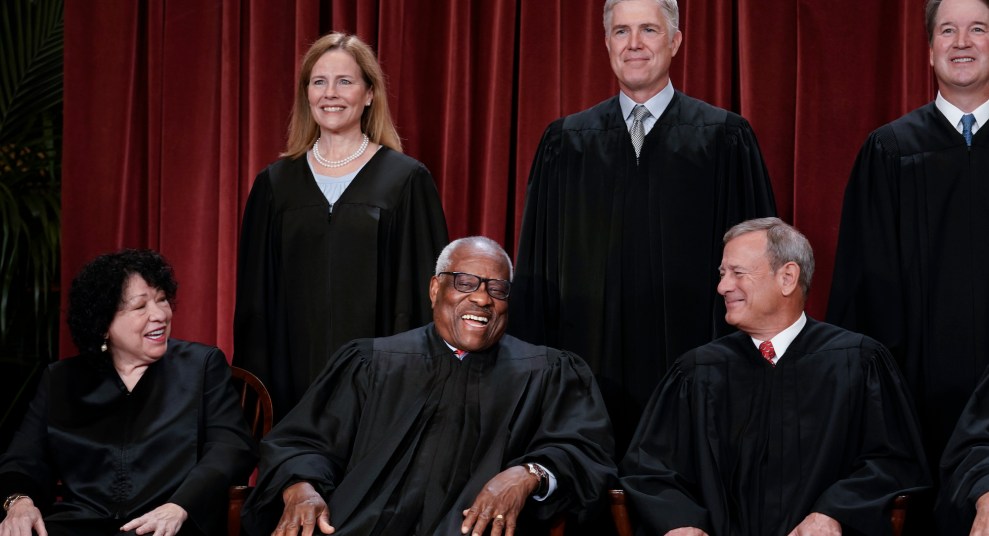
J. Scott Applewhite/AP
On Thursday, the Supreme Court issued a unanimous opinion that provides liberals, conservatives, and libertarians a rare chance to celebrate the same thing. The court’s decision in Tyler v. Hennepin County will block about a dozen states and the District of Columbia from keeping surplus funds from the homes they sell after residents fail to pay property taxes.
The case centered on Geraldine Tyler, a 94-year-old Minnesota woman whose home was taken by Hennepin County after she failed to pay $15,000 in property taxes and other fees. The county then sold her home for $40,000 in 2016 then kept the extra $25,000.
The conservative Pacific Legal Foundation argued on Tyler’s behalf that keeping excess funds from tax sales violates the takings clause of the Fifth Amendment, which blocks the government from taking private property without “just compensation.” A wide range of liberal organizations, including the ACLU, filed amicus briefs supporting PLF’s position.
All nine justices were persuaded. “A taxpayer who loses her $40,000 house to the State to fulfill a $15,000 tax debt has made a far greater contribution to the public fisc than she owed,” Chief Justice John Roberts wrote in the unanimous decision. “The taxpayer must render unto Caesar what is Caesar’s, but no more.”
The county’s few supporters were mostly local and state governments that also keep surplus funds from tax sales. Neal Katyal, a self-professed “extremist centrist” who served as Barack Obama’s acting solicitor general, made the case against Tyler during oral arguments last month. He argued that Hennepin County’s position was supported by the Statute of Gloucester of 1278, which gave feudal lords in England the ability to recover their land from tenants. Justice Neil Gorsuch told him, “I just don’t understand what on earth any of that history has to do with this case.”
Katyal, whose hourly rate is reportedly more than $2,400 per hour, claimed that the problem at the center of the case did not actually exist. “In the real world, people don’t walk away…from meaningful equity in their homes,” he insisted. As I reported last month, that is not true:
Tanya Dwyer, an attorney in New York with Legal Services of the Hudson Valley, told me she has a client in New York who owes $100,000 on a home he inherited that is worth $600,000. The county will keep the full amount if the home is sold. “These people are in a bad situation,” Dwyer stresses. “They’re not willfully not paying their taxes. They’re just broke.”
Homeowners may miss notices provided to warn them, or they may lack the ability to understand what is happening. AARP stressed in a brief that laws that allow states to keep excess funds have a “devastating and disproportionate impact on the financial security of older adults.” Public Citizen echoed that, arguing “[v]ulnerable populations such as the elderly and disabled, as well as low-income and minority populations, are disproportionately harmed by tax sales.”
Angela Erickson, PLF’s strategic research director, used public records to identify more than $860 million in home equity that was lost between 2014 and 2021 in 12 states and the District of Columbia. The group focused on the largest jurisdictions in those states, and did not attempt a full accounting. “It’s definitely more than a billion [dollars],” Erickson says about the full total. “It’s probably more than $2 billion, but it’s hard to tell.” The average homeowner in Massachusetts affected by a tax foreclosure lost $172,000 in home equity, according to PLF’s research.
In a concurring opinion joined by Justice Ketanji Brown Jackson, Gorsuch suggested that the Eighth Amendment’s prohibition against excessive fines was violated along with the takings clause. “Economic penalties imposed to deter willful noncompliance with the law are fines by any other name,” he wrote. “And the Constitution has something to say about them: They cannot be excessive.”
A more expansive interpretation of the excessive fines clause could potentially block the civil asset forfeiture used by police departments to take property that was allegedly used in criminal activity. That is an outcome that would be celebrated by both progressives and libertarians.
The case for conservatives would be more complicated: It is one thing to limit the power of a local government, but quite another to take on the cops.








